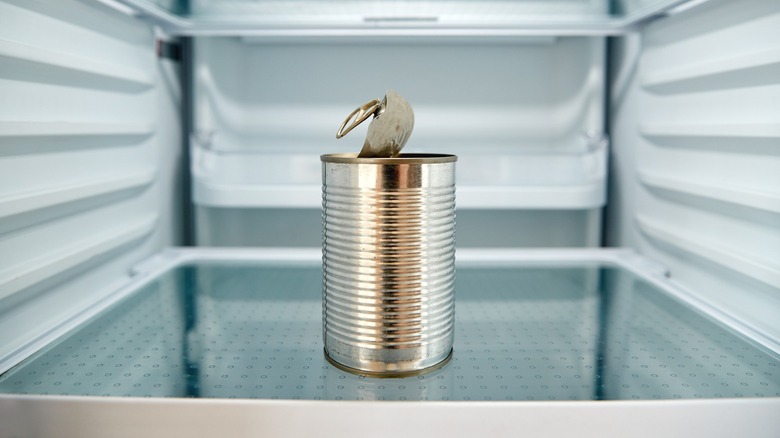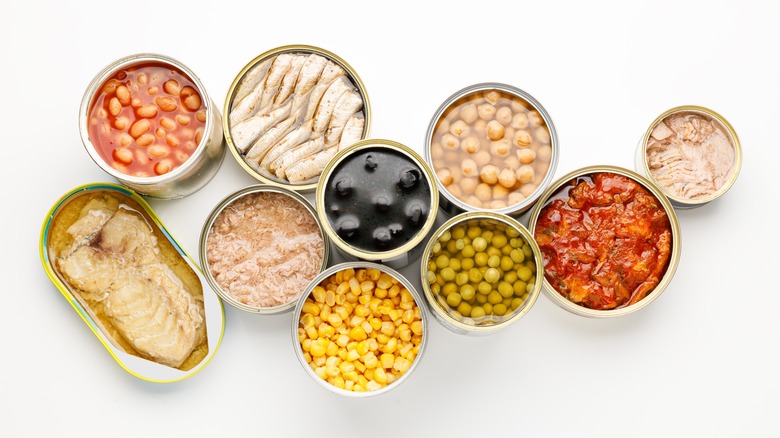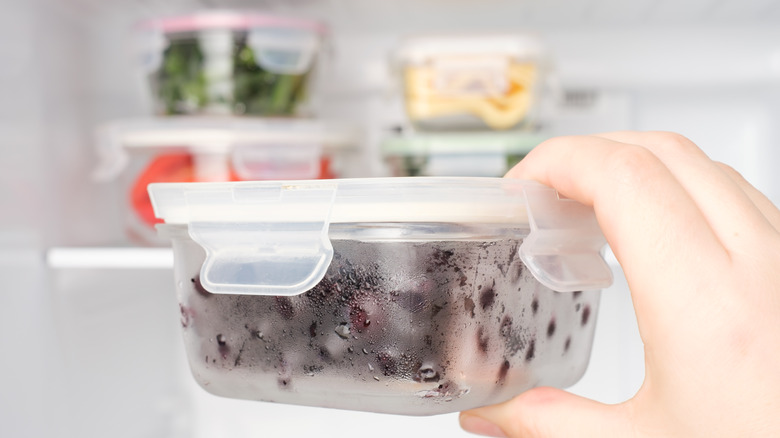What Happens When You Leave Canned Food Open In The Fridge
Peas. Beans. Tuna. Beets. Tomatoes. Chances are you have some of these common canned foods in your pantry. So it's inevitable that one day you'll find yourself grappling with the dilemma of how to properly store a can that is opened but unfinished. Whether you're making a tuna salad sandwich for one or a salad that doesn't need a whole can of garbanzo beans, determining the right way to preserve what's left can be puzzling. The obvious answer is the fridge, a blessed appliance for storing leftover food. But simply placing an open can in the fridge seems wrong. Confusingly, it can be — but it isn't always.
Metal cans have been used to safely store all kinds of foods since the early 19th century, extending the shelf life of meats, vegetables, and fruits for years. Doomsday preppers and bulk buyers are well aware of this fact. However, there is occasionally disagreement about the safety of cans. In particular, concerns have been raised about metals and bisphenol-A (BPA) leaching into foods or the risks of exposure to contaminants collected on a can's lid, from dust to bacteria, when popping it open. While you should never leave unwrapped or uncovered leftovers in the fridge, placing an open (and properly covered) can inside is technically safe. But that still doesn't mean you should. To preserve the freshness of canned tuna, beans, and any other ingredients you keep on hand and have left over, it's always best to transfer them to a sealed, airtight container. The reasoning comes down to quality and flavor.
Is there cause for concern?
While the thought of metals contaminating your canned foods is a concerning one, there's little basis for worry if all you're using the can for is storage. Most food cans in the U.S. are made of steel, which could leach minuscule amounts of chromium and nickel in certain circumstances, like cooking. For instance, a study published in the Journal of Agriculture and Food Science found that these metals can be detected in foods cooked in stainless steel cookware for varying durations. However, if you aren't cooking in a can, it's safe for food storage.
Additionally, to prevent corrosion and preserve food quality, manufacturers line the inside of steel food cans with protective coatings. Ironically, the epoxy resin historically used in these linings often contained BPA, a chemical linked to endocrine disorders and other health issues. While the FDA closely monitors levels of BPA in food packaging to ensure consumer safety, 98% of food cans made in the U.S. now use BPA-free linings, according to the Can Manufacturers Institute.
As far as cross-contamination goes, it's essential to clean food cans before opening to prevent the spread of germs and bacteria — and, in turn, foodborne illnesses. Dust, dirt, and other debris can collect on cans during storage. For peace of mind, wipe the can's lid before opening and then pour its contents into a new, clean container. This is best for preserving the freshness of whatever you don't use, which is why storing food in an open can isn't the best idea after all.
Storing food in opened cans diminishes quality and flavor
The USDA confirms that it's safe to store food in open cans for a certain amount of time. How long depends on what's inside. High-acid canned goods, including tomato products, fruit, and foods in vinegar-based sauces can stay in their original packaging for five to seven days, while low-acid canned goods like meat, beans, corn, and more should only remain stored in open cans for three to four days. However, the USDA suggests a better alternative: Transferring the canned food to a glass or plastic storage container.
Storing leftover canned food in a sealed, airtight container in the fridge will help preserve its flavor and quality. If possible, use a container with a silicone or rubber sealing system for best results. This method ensures that no air or moisture can come into contact with the food inside, mimicking the canning process. It's still best to consume any opened canned foods within the same timeframe that the USDA recommends for storing them in cans. But you can rest assured they'll taste better and fresher when eaten or cooked out of an airtight container, improving the quality of your next dish.
Companies are working to develop innovative ways to reseal canned goods after opening, which could eventually make them a more reliable storage option. However, until more advanced food storage technology is widely available, your trusty plastic or glass containers are your best bet.


